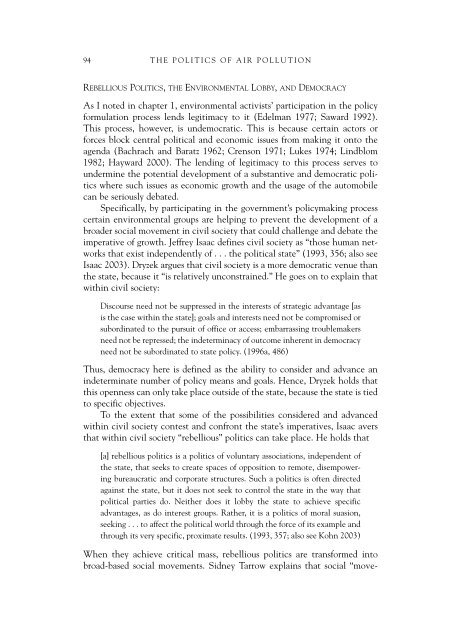GEORGE A. GONZALEZ - fieldi
GEORGE A. GONZALEZ - fieldi
GEORGE A. GONZALEZ - fieldi
Create successful ePaper yourself
Turn your PDF publications into a flip-book with our unique Google optimized e-Paper software.
94THE POLITICS OF AIR POLLUTIONREBELLIOUS POLITICS, THE ENVIRONMENTAL LOBBY, AND DEMOCRACYAs I noted in chapter 1, environmental activists’ participation in the policyformulation process lends legitimacy to it (Edelman 1977; Saward 1992).This process, however, is undemocratic. This is because certain actors orforces block central political and economic issues from making it onto theagenda (Bachrach and Baratz 1962; Crenson 1971; Lukes 1974; Lindblom1982; Hayward 2000). The lending of legitimacy to this process serves toundermine the potential development of a substantive and democratic politicswhere such issues as economic growth and the usage of the automobilecan be seriously debated.Specifically, by participating in the government’s policymaking processcertain environmental groups are helping to prevent the development of abroader social movement in civil society that could challenge and debate theimperative of growth. Jeffrey Isaac defines civil society as “those human networksthat exist independently of ... the political state” (1993, 356; also seeIsaac 2003). Dryzek argues that civil society is a more democratic venue thanthe state, because it “is relatively unconstrained.” He goes on to explain thatwithin civil society:Discourse need not be suppressed in the interests of strategic advantage [asis the case within the state]; goals and interests need not be compromised orsubordinated to the pursuit of office or access; embarrassing troublemakersneed not be repressed; the indeterminacy of outcome inherent in democracyneed not be subordinated to state policy. (1996a, 486)Thus, democracy here is defined as the ability to consider and advance anindeterminate number of policy means and goals. Hence, Dryzek holds thatthis openness can only take place outside of the state, because the state is tiedto specific objectives.To the extent that some of the possibilities considered and advancedwithin civil society contest and confront the state’s imperatives, Isaac aversthat within civil society “rebellious” politics can take place. He holds that[a] rebellious politics is a politics of voluntary associations, independent ofthe state, that seeks to create spaces of opposition to remote, disempoweringbureaucratic and corporate structures. Such a politics is often directedagainst the state, but it does not seek to control the state in the way thatpolitical parties do. Neither does it lobby the state to achieve specificadvantages, as do interest groups. Rather, it is a politics of moral suasion,seeking... to affect the political world through the force of its example andthrough its very specific, proximate results. (1993, 357; also see Kohn 2003)When they achieve critical mass, rebellious politics are transformed intobroad-based social movements. Sidney Tarrow explains that social “move-









